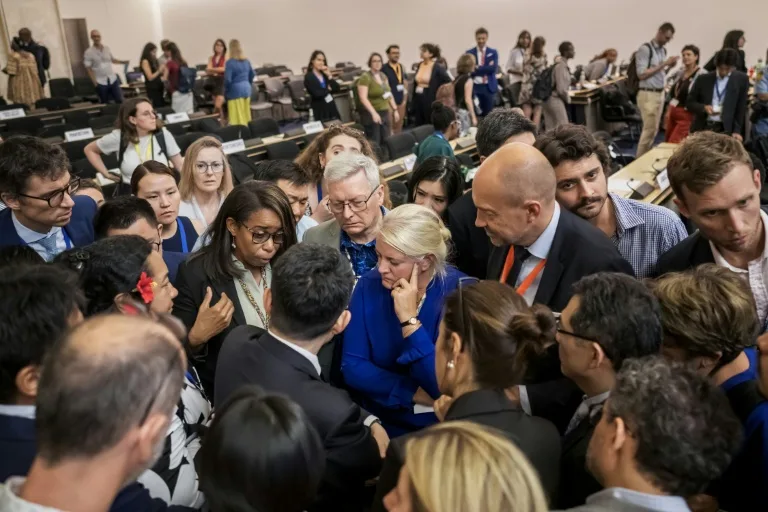News Flash
News Flash

GENEVA, Aug 15, 2025 (BSS/AFP) - Countries trying to break the deadlock and strike a landmark global treaty on combating plastic pollution negotiated through the night into Friday on a last-minute revised proposal.
The new draft, issued by the talks chair after the original Thursday deadline passed, contains more than 100 unresolved passages of text -- but constitutes an "acceptable basis for negotiation", two sources from different governments told AFP.
However, several environmental NGOs said the new text still did not go far enough to protect human health and the environment.
After three years of negotiations, nations wanting bold action to turn the tide on plastic garbage were trying to build last-minute bridges with a group driven by oil-producing states.
Talks chair Luis Vayas Valdivieso issued his revised draft text after countries from all corners brutally shredded his previous version issued Wednesday, plunging the talks into disarray.
The Ecuadoran diplomat spent Thursday in frantic negotiation with multiple regional groups, resulting in a new text that went some way towards appeasing both major blocs.
The High Ambition Coalition, which includes the European Union, Britain and Canada, and many African and Latin American countries, wants to see language on reducing plastic production and the phasing out of toxic chemicals used in plastics.
A cluster of mostly oil-producing states calling themselves the Like-Minded Group -- including Saudi Arabia, Kuwait, Russia, Iran, and Malaysia -- want the treaty to focus primarily on waste management.
The new text "is far from what is needed to end plastic pollution," however, "it can be the springboard to get there, if we sharpen it in a next round", Panama's negotiator Juan Carlos Monterrey said.
A diplomatic source from another country told AFP it was an "acceptable basis for negotiation".
- In search of 'middle ground' -
A total of 185 countries have been negotiating since August 5 at the United Nations headquarters in Geneva. Five previous rounds of talks over three years failed to land a treaty.
One country's chief negotiator told AFP the new draft felt "more balanced text -- not too bad but not too good either. At least it feels like the chair is listening. But many of us are asking what's going to be the next steps".
As for whether there was much movement from the Like-Minded Group, the negotiator said: "Nothing. It's the same...I'm not so sure if there's momentum."
The plastic pollution problem is so ubiquitous that microplastics have been found on the highest mountain peaks, in the deepest ocean trench and scattered throughout almost every part of the human body.
On current trends, annual production of fossil-fuel-based plastics will nearly triple by 2060 to 1.2 billion tonnes, while waste will exceed one billion tonnes, according to the Organisation for Economic Cooperation and Development.
With 15 million tonnes of plastic dumped in the ocean every minute, French President Emmanuel Macron asked: "What are we waiting for to act?"
"I urge all states gathered in Geneva to adopt an agreement that truly meets the scale of this environmental and public health emergency," he posted on X.
"We need to have a coherent global treaty. We can't do it on our own," said Environment Minister Deborah Barasa of Kenya, a member of the High Ambition Coalition seeking aggressive action on plastic waste.
Barasa told AFP that nations could strike a treaty now, then work out some of the finer details down the line.
"We need to come to a middle ground," she said.
IPEN, a global network aimed at limiting toxic chemicals, said the level of ambition in the new draft text "cannot become the new normal for these negotiations".
And the World Wide Fund for Nature told AFP: "Efforts to pull together a treaty that all parties will accept has amounted to a text so compromised, so inconsequential, it cannot hope to tackle the crisis in any meaningful way."